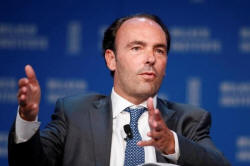|
Kyle Bass still short
yuan, says China credit bubble 'metastasizing'
 Send a link to a friend
Send a link to a friend
 [June 16, 2017]
By Jennifer Ablan [June 16, 2017]
By Jennifer Ablan
NEW
YORK (Reuters) - Hayman Capital Management founder Kyle Bass on Thursday
said he remains short the Chinese yuan despite the country's latest
change to the guidance rate, because he believes credit bubble problems
are “metastasizing.”
“What the public narrative is and what they have been doing behind the
scenes are two completely different stories,” Bass said in a telephone
interview. “China has been masterful controlling the public narrative.
As a fiduciary, I have no idea how anyone can invest in China.”
Famed for his successful bet against the U.S. housing market during the
2007-2009 global financial crisis, Bass said Hayman’s short position in
the yuan, or renmimbi (RMB), is a “core” position and has “always been
meaningful.”
Bass, who has long argued that the Chinese yuan is set to fall 30
percent against the U.S. dollar, identified fresh warning signs that
China’s credit problems have spread.
These include how the five-year MTN yield, trading at 5 percent, has
exceeded the bank loan rate, about 4.75 percent, for the first time, and
that Moody's Investors Service recently downgraded China's credit
ratings for the first time in nearly 30 years. Bass also highlighted
concerns about China's capital controls and the country's shadow-banking
system.

Indeed, CBRC vice-chairman Cao Yu said China established 12,836 creditor
committees by the end of last year, to help manage credit of 14.85
trillion yuan. Bass said this amount represents 20 percent of the loans
in Chinese banks, net of mortgages.
Bass said he believes non-performing loans at Chinese financial
institutions are running at a 20 percent rate, not the 1.7 percent rate
that has been widely reported.
“In fact, 14.85 trillion is more than all of the equity in the entire
banking system,” he said. “The Chinese have masterfully swept all of
this under the rug.”
As credit conditions have tightened in the world's second-largest
economy, borrowing costs for companies have been rising. Banks are
raising lending rates, including mortgage rates, and are wary of taking
on more exposure to overheated sectors such as property. That trend will
set the stage for a gradual slowdown in economic activity in coming
months, analysts believe, though no one foresees a sharp decline as
stability is the watchword ahead of a major political leadership
reshuffle later this year.
[to top of second column] |

Kyle Bass, Chief Investment Officer of Hayman Capital Management,
speaks at the Milken Institute Global Conference in Beverly Hills,
California, U.S., May 4, 2016. REUTERS/Lucy Nicholson

Bass
said China's Anbang Insurance Group, one of China's most aggressive buyers of
overseas assets whose chairman has been detained by the police, illustrates
China business risks.
"Anbang has raised money by selling high-yielding, high-risk, short-term life
insurance policies with death benefits," Bass said. "They have the ultimate
problem with extremely short-term liabilities funding very long-term assets.
Anbang is just the beginning of a very large problem with asset-liabilty
mismatches in China's financial system."
Bass noted that he has not always been a China bear and said China has been
looking to force out one-way bearish bets on the yuan with second change this
year in how the currency's guidance rate is calculated.
“This fixing mechanism throws a bit of unknown into the calculation,” he said.
Still, he said he was not throwing in the towel on his short position. “The PBOC
wants you to do that," Bass said. "I don’t know how they can hold this all
together. The numbers are telling me that we are right. The numbers are getting
so bad so quickly.”
(Reporting By Jennifer Ablan; Editing by David Gregorio)
[© 2017 Thomson Reuters. All rights
reserved.] Copyright 2017 Reuters. All rights reserved. This material may not be published,
broadcast, rewritten or redistributed.
 |